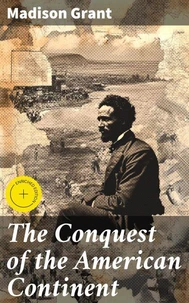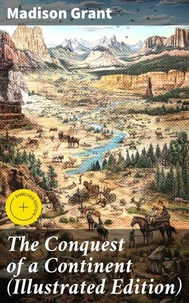The Conquest of the American Continent
Par :Formats :
Disponible dans votre compte client Decitre ou Furet du Nord dès validation de votre commande. Le format ePub est :
- Compatible avec une lecture sur My Vivlio (smartphone, tablette, ordinateur)
- Compatible avec une lecture sur liseuses Vivlio
- Pour les liseuses autres que Vivlio, vous devez utiliser le logiciel Adobe Digital Edition. Non compatible avec la lecture sur les liseuses Kindle, Remarkable et Sony
 , qui est-ce ?
, qui est-ce ?Notre partenaire de plateforme de lecture numérique où vous retrouverez l'ensemble de vos ebooks gratuitement
Pour en savoir plus sur nos ebooks, consultez notre aide en ligne ici
- Nombre de pages225
- FormatePub
- ISBN859-65--4772328-8
- EAN8596547723288
- Date de parution16/11/2023
- Protection num.Digital Watermarking
- Taille1 Mo
- Infos supplémentairesepub
- ÉditeurDIGICAT
Résumé
In "The Conquest of the American Continent, " Madison Grant presents a provocative examination of the forces shaping the United States throughout its tumultuous history. Through a blend of historical analysis and socio-political commentary, Grant explores themes of expansionism, immigration, and national identity, demonstrating how these elements have both defined and divided the nation. His literary style is characterized by a meticulous attention to detail and an unwavering commitment to a particular ideological framework that underscores the intersection of American exceptionalism and eugenics, marking a significant, albeit controversial, contribution to early 20th-century American literature and thought.
Madison Grant, an influential figure in the early 1900s, was not only a conservationist and a lawyer but also a prominent advocate for eugenics, which deeply influenced his perspective. His socio-political context, marked by the increasing influx of immigrants and the debates over American identity, prompted Grant to articulate a vision of a 'pure' American society. His views on race and ethnicity were both reflective and prescriptive, resonating with contemporary movements and laying the groundwork for future contentious discourses.
This book is essential for readers interested in the complex interplay of race, identity, and American history. Grant's unflinching exploration of these themes invites critical reflection and challenges readers to confront the legacies that shape modern America.
Madison Grant, an influential figure in the early 1900s, was not only a conservationist and a lawyer but also a prominent advocate for eugenics, which deeply influenced his perspective. His socio-political context, marked by the increasing influx of immigrants and the debates over American identity, prompted Grant to articulate a vision of a 'pure' American society. His views on race and ethnicity were both reflective and prescriptive, resonating with contemporary movements and laying the groundwork for future contentious discourses.
This book is essential for readers interested in the complex interplay of race, identity, and American history. Grant's unflinching exploration of these themes invites critical reflection and challenges readers to confront the legacies that shape modern America.
In "The Conquest of the American Continent, " Madison Grant presents a provocative examination of the forces shaping the United States throughout its tumultuous history. Through a blend of historical analysis and socio-political commentary, Grant explores themes of expansionism, immigration, and national identity, demonstrating how these elements have both defined and divided the nation. His literary style is characterized by a meticulous attention to detail and an unwavering commitment to a particular ideological framework that underscores the intersection of American exceptionalism and eugenics, marking a significant, albeit controversial, contribution to early 20th-century American literature and thought.
Madison Grant, an influential figure in the early 1900s, was not only a conservationist and a lawyer but also a prominent advocate for eugenics, which deeply influenced his perspective. His socio-political context, marked by the increasing influx of immigrants and the debates over American identity, prompted Grant to articulate a vision of a 'pure' American society. His views on race and ethnicity were both reflective and prescriptive, resonating with contemporary movements and laying the groundwork for future contentious discourses.
This book is essential for readers interested in the complex interplay of race, identity, and American history. Grant's unflinching exploration of these themes invites critical reflection and challenges readers to confront the legacies that shape modern America.
Madison Grant, an influential figure in the early 1900s, was not only a conservationist and a lawyer but also a prominent advocate for eugenics, which deeply influenced his perspective. His socio-political context, marked by the increasing influx of immigrants and the debates over American identity, prompted Grant to articulate a vision of a 'pure' American society. His views on race and ethnicity were both reflective and prescriptive, resonating with contemporary movements and laying the groundwork for future contentious discourses.
This book is essential for readers interested in the complex interplay of race, identity, and American history. Grant's unflinching exploration of these themes invites critical reflection and challenges readers to confront the legacies that shape modern America.





